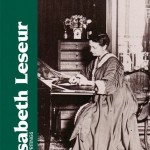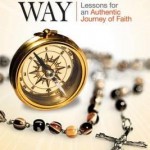In the new encyclical, Lumen Fidei, or “The Light of Faith,” Pope Francis, with considerable core contributions from Pope Emeritus Benedict XVI, explains how through “the celebration of the sacraments, the Church hands down her memory especially through the profession of faith.”
The creed, Lumen Fidei explains, “does not only involve giving one’s assent to a body of abstract truths; rather, when it is recited the whole of life is drawn into a journey towards full communion with the living God. We can say that in the creed believers are invited to enter into the mystery which they profess and to be transformed by it. To understand what this means, let us look first at the contents of the creed. It has a Trinitarian structure: the Father and the Son are united in the Spirit of love. The believer thus states that the core of all being, the inmost secret of all reality, is the divine communion.”
However can we live this Trinitarian reality in the busy chaos of our daily lives?
Randy Hain answers his call to an apostolate of walking the world through how to have this remarkable, transformation, Something Better. This, in fact, is the title of his latest book Something More: The Professional’s Pursuit of a Meaningful Life. In conversation, he walks through the talk that can help us toward this something so much better than anything we could make with our own hands, buy with our own money, even imagine to ask for on our own.
Q: Catholics and others have just finished up another Fortnight for Freedom. Without the word Fortnight, I feel like this is exactly what Something More is about. Every day. Am I onto something?
A: I believe you are. The core themes of Something More are authenticity, priorities, and making tough choices. But, underneath all of this is the necessity of freedom. It is important to recognize that if we are unsatisfied or unhappy with our lives, we have the freedom to make changes. Many people I encounter feel trapped by their circumstances and believe they have limited options. Embracing the concept of freedom can be one of the catalysts which will lead to a more meaningful life.
Q: Do you find yourself, as a businessman, relating to the Green family that runs the Hobby Lobby arts and crafts store?
A: I absolutely relate to them and am grateful for their courageous fight. As a Christian (Catholic) businessman, I see the HHS Mandate representing a fundamental attack against my beliefs and still another unwelcome intrusion by the government into my life and my business. The Green family and other business owners who are suing the government over the HHS Mandate should be commended.
Q: Is this religious-freedom talk you hear in conjunction with the HHS abortion-drug, contraception, sterilization mandate real to you?
A: It is very real and a subject of ongoing discussion among my fellow Catholic business leaders. I lead a small company and have had to take extraordinary measures to not be in violation of my core beliefs (as it relates to the HHS Mandate). Where it has affected my business most is the restrictions on our full- time hiring and the need to bring in part-time employees who do not require health insurance. We are making this work, but it is difficult. We are looking at other options, but few are available. This is a frequent subject of prayer for me!
Q: Could another title for your book be borrowed from G. K. Chesterton? What’s wrong with the World? Me!?
A: You make a good point, Kathryn. I am certainly an advocate for taking personal responsibility and I am not a fan of whining, but I think the book goes much deeper than simply identifying ourselves as the “problem.” Each of us has an opportunity to contribute good to the world, but many of us don’t know where to begin. My book walks the reader through several stages, starting with developing self-awareness, identifying our motivations and obstacles and providing several examples of other professionals who have sought more meaning out of life. I am hopeful the reader will come to realize they can make a positive contribution to the world by leading a life filled with meaning and purpose.
Q: However do we get our priorities straight? Who has time?
A: We have to ask ourselves what is truly important to us and align our actions with this list. If we don’t have our priorities straight, life would be a chaotic adventure with no attainable goals and no overarching purpose. Many of us, if we are honest, would admit that we don’t have our priorities in order or even know how to identify them. You asked “who has time?” and my response to this is to weigh our options. We either slow down enough to get clarity around what is important and focus our energies more efficiently or we realize at the end of our lives that we accomplished a lot of activity and bought a lot of stuff, but we left no positive legacy behind. I see this most clearly in business leaders who had incredibly successful careers, but in their retirement recognize that they don’t know their own children and spouses, made no positive difference in the community and have no faith in their lives.
Q: Do we even have the luxury to be good dads and moms and friends? We’ve all got roofs to pay for.
A: Of course we can! Yes, we have to make a living and support our families, but we should ask ourselves if our work exists to serve our families or do our families exist to serve our work? Having been through this personally, I am grateful that I made a life-changing decision to leave my old career at a large company which required constant travel and had a toxic culture for a new career with a much smaller company which has a great culture and requires no travel. This change has allowed me to spend more time with my family and recognize that my old priorities of balancing work and family needed to give way to God first, Family second and Work third in my list of priorities. When I speak around the country, I like to ask audiences to imagine what would be written on their tombstones. If the options are: He Had a Great Career or Loving Husband and Father, which would we choose? More importantly, are we making good choices now to achieve the latter option?
Q: As a culture do we have our marital priorities a mess? How do we grapple with them without casting judgment on anyone?
A: Great question. Yes, we do have a mess on our hands of our own making. I support marriage as it was intended which is only between one man and one woman. We know that the purpose of the marital union is procreation. I have nothing against homosexuals or anyone else who might desire other options, but I strongly oppose anything called marriage outside of what God intended. This doesn’t make me a bigot. I simply have the right to disagree and will lovingly respect the beliefs of others. I ask the same in return. You asked me earlier about priorities. Because God is first in my life, it is easy to be obedient and follow what He has taught us through Scripture and Church teaching. The key is for others who oppose this view to engage in peaceful and respectful dialogue which I can only hope they would desire as well.
Q: How are questions about “a meaningful life” and “emptiness” anything more than a recipe for self-absorption?
A: I don’t see it that way at all. Consider this famous quote by Leo Tolstoy: “Everyone thinks of changing the world, but no one thinks of changing himself.” It is wonderful to desire making a positive difference in the world, but we need to begin with ourselves. The ability to look inward, be self-aware/honest enough to identify our flaws and make changes is critically important if we want to build a solid foundation from which to help others. Most importantly, the answer to the questions about a meaningful life and emptiness can be answered by assessing the role God plays in our lives. If He is truly first in our lives and if we love Him and do His will, we will be on the path to a meaningful life. Also, I have never encountered anyone who truly loved God who felt “empty.”
Q: How can a “lack of boundaries” keep us from doing God’s will? Aren’t we supposed to be self-giving, rather than holding back?
A: If I understand your question, I would say that loving and serving God creates clear boundaries which will keep us focused on doing His will. Consider people who call themselves atheists, agnostic or maybe even Christians who don’t truly live out their faith. Watch their behavior. They likely have few boundaries and certainly don’t aren’t doing His will. They are more likely to accept an “anything goes” type of morality which will keep them distant from God. I think this connects to your earlier question about marriage. If we succumb to societal pressure and accept the anything goes mindset and go against our faith, we will be outside of the will of God. It is difficult to resist and we will be attacked for it, but having clear boundaries and standing up for our principles will bring us grief on earth…and rewards in Heaven.
Q: Is inauthenticity at the root of many of our cultural, political, financial problems?
A: It is not the sole issue, but it is an important one. Political correctness has seeped into our lives like a disease and there seems to be an overwhelming fear about speaking the truth, calling out evil when we see it and embracing unpopular positions (especially when it relates to God). We see this prevalent not only in our government and business leaders, but also in ordinary people like you and me. We have created walls and multiple personalities, often developed at a very young age, which makes us believe we can’t bring our faith and beliefs to work or into the public square. Consider how rare it is for anyone, especially government leaders, to actually say what they really think with little regard for the consequences. It is actually (and sadly) quite astonishing in today’s world! How do we make this better? I think it starts with each of us doing our part to set a good example. Be the same person all the time and not shy away from unpopular topics. Embrace and live out our core beliefs. The world would be transformed if everyone spent one day being truly authentic.
Q: How can you be intentional when life can be so unpredictable?
A: Life is unpredictable, but we have the freedom to make choices which by definition will make it more predictable. I pray every day and this doesn’t happen by accident. All of my prayers are on my smart phone and they are actually scheduled because they are important to me. I carry my Rosary with me at all times. I have made intentional choices to have a more predictable prayer life. Spending time with my family, especially dinner, is very important to me. Therefore, I don’t schedule any calls or meetings after 5:00 P.M. I force my busy work calendar to conform around my family life, because family is more important than work. I do a great deal of writing and need quiet time to get it done. I have been getting up at 4:00 A.M. for over eight years to squeeze in my writing. It is important and I have been intentional about making it happen.
Q: Is there a trick you’ve learned to being authentic, always? Are there habits and prayers that are good guides?
A: My first response is recognizing that I struggle with authenticity like anyone else! I begin my prayers each day by asking Christ to grant me humility and courage to be authentic throughout the day. I ask for our Blessed Mother’s intercession when I pray the Rosary to help me be the same person at all times. I also recommend the Jesuit Daily Examen as a way to reflect and pray throughout the day on challenges we encounter. As I get older and grow deeper in my faith, I recognize my growing intolerance for “fake” people. Life is too short and I prefer to say what needs to be said with love and mutual respect instead of dancing around the subject for 30 minutes. Directness and authenticity do not have to be ugly or uncomfortable. In fact, I would encourage your readers to see authenticity as liberating and necessary to lead a more meaningful life.
Q: Do you read the Bible? Is it part of the professional pursuit of Something More? Or is that way unsophisticated of me?
A: I read the Bible. I normally read it in the form of the Magnificat or a great iPhone app called Laudate. I also get daily scripture through In Conversation with God by Francis Fernandez. This is a seven book series with wonderful meditations based on the Mass readings each day. No matter what faith background you have, I strongly encourage bible or some other spiritual reading related to your faith. The life lessons, moral instruction and personal development found in this type of reading is essential to the pursuit of a meaningful life.
Q: What nourishes you? Who and what will get you to heaven?
A: My Catholic faith and relationship with Christ nourishes and sustains me. Since I surrendered to Christ in 2005 and joined the Church in 2006, my life has been utterly transformed. I feel a bit like the Prodigal Son and Saul on the Road to Damascus at times! My wife and sons also nourish me. My wife and I are clear that our vocation is to help our family (and everyone else) get to Heaven and I strongly rely on my family as we all travel slowly towards our Heavenly home. I am thankful that I have come to realize since joining the Church that we are made for Heaven and not this world…and we need to act accordingly.
Q: What’s the best advice you’ve heard?
A: My father is a man of few words, but he usually has great wisdom about life to offer. He once told me when I was in college to keep life simple and not to focus on acquiring things which don’t matter. I didn’t begin to understand this wisdom until I was in my mid-thirties with children of my own. Now that I am in my late 40s, I am pretty focused on avoiding distractions, simplifying my life, and not being attached to stuff I can’t take with me when I go. I also try to pass that along to my sons as they grow older.
Q: Why are you so into the concept of an “Integrated Catholic Life”?
A: When I surrendered to Christ in the first Mass I attended in the fall of 2005 after spending 23 years in the “spiritual wilderness” with no faith, I recognized I was committing to a new set of priorities. No longer was it simply balancing family and work. Now, it was Christ, family, and work in that order, with Christ at the center of everything I do. This was life changing for me and has been the theme of my writing, ministry in the Church, work life and how I interact with my family ever since. One of the first Catholic-related documents I read as I was discerning about joining the Church was Blessed John Paul II’s Christifideles Laici, which has been the catalyst for much of my thinking on integration: “The unity of life of the lay faithful is of the greatest importance: indeed they must be sanctified in everyday professional and social life. Therefore, to respond to their vocation, the lay faithful must see their daily activities as an occasion to join themselves to God, fulfill his will, serve other people and lead them to communion with God in Christ.” This future saint said it so much more eloquently than I ever could.












